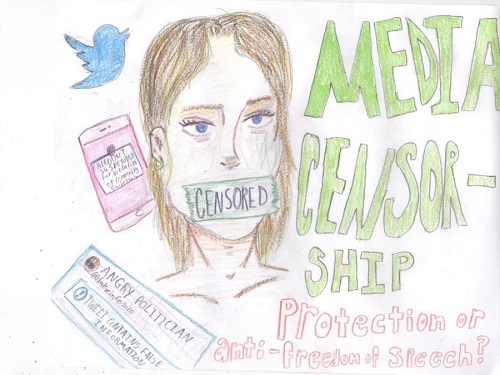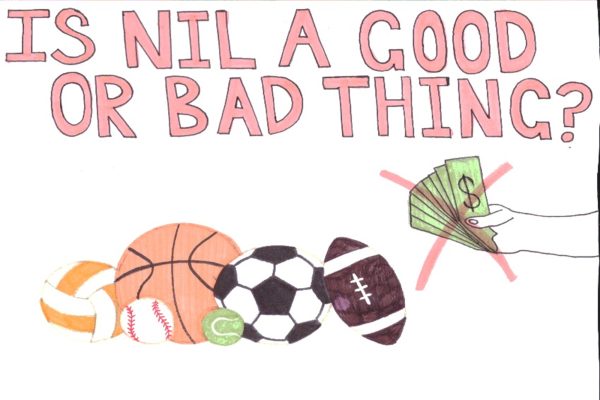Social media censorship, company’s right or freedom of speech violation?

Editorial cartoon
The United States is built on numerous simple ideals that establish the freedoms of its citizens. One of its most important ones is the freedom of speech, which allows Americans to be able to say just about anything without punishment from the government. This freedom is so intrinsic to America, that it has become almost synonymous to the definition of freedom itself, and millions of Americans are extremely wary about censorship. However, in the age of social media, some actions that social media companies have been taking have lead people to question if these platforms are contributing to censorship.
In early January, according to The New York Times, Congresswoman Marjorie Taylor Greene’s personal account was permanently banned from Twitter after spreading misinformation about the COVID-19 vaccine. Her official political account is still up, however.
Twitter officials have said that Representative Greene has violated their policy against misinformation about the pandemic multiple times now. Since she has violated the policy five times now, they made the decision to ban her account permanently.
To Americans who are not active on social media, this may come as a shock. However, to Americans who are active, this is familiar news.
Last year, during January of 2021, former president Donald Trump’s personal account was also banned from Twitter. This came after a slew of tweets from Trump claiming that the 2020 presidential election, in which he lost, was rigged and stolen.
In the end, this resulted in an attack against the United States capitol, allegedly committed by radical Trump supporters, because it is believed these supporters were under the belief that the election was stolen from former president Trump.
According to CNN, this caused Twitter to determine that Trump’s tweets were inciting violence and were dangerous, thus causing them to ban him permanently.
In the time before social media, this would be unthinkable. Never before has a politician’s speech been deemed so dangerous that they were banned from sharing it on such a large platform. With the age of social media now in full force, people are beginning to question if these social media companies are actually starting to impede on the freedom of speech of Americans.
However, Americans who are questioning the ban are likely confused on what the freedom of speech actually means. Many believe that it gives them the freedom to say whatever they’d like, but this isn’t exactly the case.
According to Constitutioncenter.org, the 1st Amendment does not allow the government to persecute someone for the things that they say {unless they incite lawless action}, but this protection does not extend to private organizations. Therefore, the federal government cannot impede the freedom of speech, but companies, like Twitter, have every right to take down speech they deem inappropriate.
Twitter, along with just about every social media site, makes this fact clear to users when they sign up, too. When someone is first signing up for their Twitter account, they are presented with a Terms of Service, which serves as somewhat of an online contract. In order to have an account, people have to agree entirely to the Terms of Service, and these terms establish the company’s power to ban people over their tweets.
Therefore, social media sites are well within their rights to ban people as they see fit, since they are private companies and cannot be forced to have certain content on their sites.
Because social media has this power, they are able to protect people from hate speech, or stop the spread of misinformation. This not only garners a safe social media space, but this can also help keep the real world safe.
For example, according to the CDC.gov, the spreading of misinformation about the COVID-19 vaccine has negatively harmed vaccination rates around the world, which in turn has put thousands of lives in danger. If someone sees misinformation and decides not to get the vaccine, their life could potentially be in danger if they get sick, since vaccination lowers the risk of getting sick and severe illness.
Even with this in mind, there are still some Americans who question if social media companies should have this much power.
Rob Miraldi, a journalism professor at the State University of New York, says that while these companies are not directly going against the First Amendment, they are still actively harming what the Freedom of Speech stands for, which is the power of open-debate.
Social media is a powerful entity, and it’s where millions of people interact every single day. Some argue that if social media impedes on people’s speech, then democracy will be harmed, because social media is where many go to debate and discuss politics. If people are unable to argue their controversial topics on the internet, then people argue that democracy will die.
However, social media sites are not focused on banning controversial debate; only the inciting of violence and harmful misinformation.
At the end of the day, social media sites are not obligated to support harmful speech by having it on their platforms. They have every right to take down posts that they deem dangerous, and taking away their ability to do so would be impeding on the rights of a private company, which is a huge violation of freedom.
At the end of the day, this country was built on the idea that people are entitled to certain freedoms that the government is not allowed to take away. The government should never be given the power to violate the Freedom of Speech, but at the same time, private companies don’t have to endorse speech if they don’t want to. They are, and should, be allowed to take things down as they see fit.





